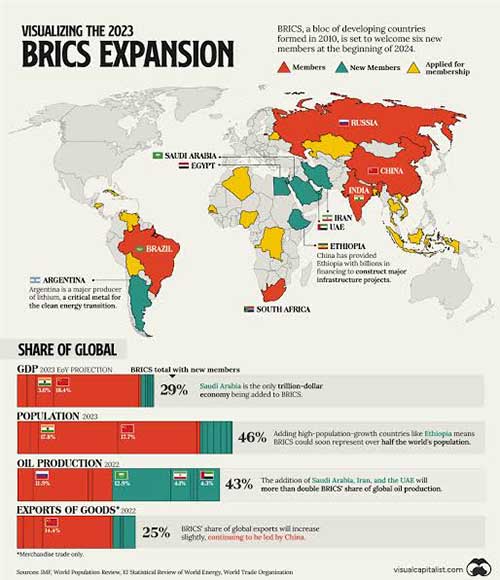Date : 02/09/2023
Relevance – GS Paper 2 – International Relations
Keywords – Johannesburg declaration, Goldman Sachs , Suez Canal
Context –
The recent decision by the leaders of Brazil, Russia, India, China, and South Africa (BRICS) to expand the group from five to eleven members has sent ripples through the global geopolitical landscape. This expansion, as articulated in the Johannesburg declaration, signifies that Argentina, Egypt, Ethiopia, Iran, Saudi Arabia, and the United Arab Emirates (UAE) will ascend to full membership status within BRICS, effective from January 1, 2024. To thoroughly appreciate the ramifications of this development, it is essential to delve into the origins and evolution of BRICS.
Origins of BRICS
BRICS, the acronym for Brazil, Russia, India, China, and South Africa, represents a formidable coalition of five major developing nations. Collectively, these nations account for a staggering 41% of the global population, contribute a substantial 24% to the global GDP, and wield considerable influence, with a 16% share of global trade. The genesis of the term "BRIC" can be traced back to Goldman Sachs in 2001, when it projected that these nations would ascend to become amongst the world's largest economies over the ensuing decades. The formalization of BRICS, however, commenced in 2006, with preliminary discussions among Russia, India, and China. This trajectory culminated in the first BRIC Summit held in 2009, and South Africa's inclusion in 2010 solidified the group as BRICS.
Expansion Process
The expansion of BRICS to incorporate six new members is underpinned by a consensus on guiding principles, standards, criteria, and procedures, although these intricate details have remained veiled from the public eye. Notably, India played a pivotal role in shaping the membership criteria and selection process, with the objective of integrating strategic partners into the group's fold. India's strategic affiliations with four of the new entrants, namely Saudi Arabia, UAE, Iran, and Egypt, underscore its proactive role in BRICS expansion. The expansion transforms BRICS into a group of eleven members, eclipsing the size of organizations such as ASEAN and the Shanghai Cooperation Organisation.
Not an "Anti-West" Bloc
It is imperative to emphasize that BRICS does not perceive itself as an "anti-West" alliance. Instead, it seeks to engage constructively with various global powers, including Western nations. France, a prominent member of the G7 and a Western power, has expressed a keen interest in fostering a more active engagement with BRICS. This highlights BRICS' potential as a platform for broad international cooperation, transcending geopolitical divides.
New Members from Africa and Latin America
Intriguingly, Argentina, despite initial reluctance from Brazil, secured its place as a new member from Latin America. Bolstered by a substantial GDP and robust economic ties with China, Argentina's inclusion signifies its growing importance in the global arena. From Africa, Ethiopia and Egypt emerged as BRICS entrants. Ethiopia, as the second most populous nation in Africa, boasts impressive economic growth rates, estimated at 6.4% for FY 2021/22, making it a noteworthy addition. Egypt, occupying a crucial geo-strategic location with 12% of global trade passing through the Suez Canal, brings its own unique significance to the group.
Inclusion of Asian Countries
The addition of Saudi Arabia, UAE, Iran, and Egypt from Asia introduces a diverse array of geopolitical affiliations. Saudi Arabia and the UAE are staunch partners of the United States, their strategic relationships having deep roots. Iran, on the other hand, has experienced a complex history with the US but has increasingly aligned itself with China in recent years. This shift is largely driven by economic imperatives, as Tehran seeks to harness Chinese investments and engage robustly with Beijing. The inclusion of these four nations is also significant in addressing the absence of Muslim-majority countries within the grouping.
Implications and Challenges
While this expansion unlocks new possibilities for BRICS, it also introduces potential contradictions within the group. Member countries possess varying geopolitical interests, potentially limiting the group's cohesive potential. Furthermore, the increasing influence of China within BRICS raises legitimate concerns about Beijing's intentions and the power dynamics within the alliance.
Russia's Perspective
Russia, as the host of the next BRICS summit slated for 2024 in Kazan, views the expanded grouping as an opportunity to underscore its global relevance, particularly in the face of diplomatic isolation. An expanded BRICS of eleven members participating in the summit provides Moscow with a strategic platform to showcase Russia's continued significance on the global stage, despite Western pressures and isolation.
Conclusion
The expansion of BRICS to incorporate Argentina, Egypt, Ethiopia, Iran, Saudi Arabia, and the UAE constitutes a momentous development in the realm of global geopolitics. This expansion underscores the evolving landscape of international relations, as emerging economies seek to consolidate their interests and shape the global agenda. However, it is essential to acknowledge that the diverse geo-political affiliations of the new member states and China's burgeoning influence within BRICS pose both opportunities and challenges for the group's future. As BRICS embraces its expanded membership, it has the potential to exert substantial influence on global politics and economics. Its success will hinge on its ability to navigate the complexities arising from this diversity and to strike a delicate balance of power among key players, particularly China and Russia, within the alliance.
Probable Questions for UPSC Mains Exam –
- "Explain the origins and evolution of the BRICS grouping, highlighting its significance in the global geopolitical landscape. Analyze the implications of the recent expansion of BRICS to include six new members and the challenges it may face in maintaining cohesion among its diverse member states." (10 marks, 150 words)
- "Discuss the role of China and Russia in the BRICS expansion and the potential power dynamics within the alliance. Evaluate the strategic importance of the new member countries from Africa, Asia, and Latin America in shaping the future direction of BRICS, considering their geo-political affiliations and economic ties." (15 marks, 250 words)
Source – Indian Express







